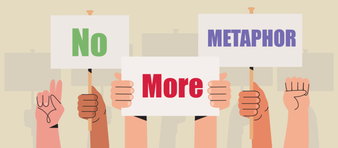 Let’s hit the ground running and create the right synergy, so we can go after low-hanging fruit. If you don’t have the bandwidth, phone me. Let’s touch base and think outside the box. I did not create the paragraph above. I stole it from the internet to illustrate that this is an essay about the annoying overuse of buzz words by people in the media. I have long ago confessed to being a TV news junky, although recently I have been able to go on a bit of a diet. But I still engage sufficiently to become irritated by the expressions one hears repeatedly, metaphors that may have been clever the first 100 times they were used but are now downright irritating. I also resent the repeated use of these words and phrases because they can also be downright intimidating. Their use is supposed to send a signal that the person using them is an up-to-date expert. The user is “in,” and if you didn’t connect with the metaphor, you are so not. I have no idea how these words become popular, but I have my suspicions. Perhaps once a year, representatives from the business and news media hold their annual “Edgy Word Convention” at a large venue, maybe Madison Square Garden. After days of meeting in small groups they come together to vote on a fresh list of buzz words aimed at cleverness, which is then disseminated to all the talking heads with instructions to begin use immediately. I know my little fantasy is not plausible, but I’m at a loss to explain how these expressions permeate newsprint and TV with such widespread usage. If anyone has other ideas, please let me know. Their origins notwithstanding, below I present my personal list of current offenders. Words and phrases that I wish never to hear again! Low Hanging Fruit. Clearly a phrase that originated with gathering produce from a tree by someone with acrophobia, the phrase has become a metaphor for something that is easy to obtain, achieve, or take advantage of. In other words, picking off what’s easy, and maybe avoiding the harder work of explaining that the tougher stuff is being avoided? Wheelhouse. One of my personal favorites when it comes to words I never want to hear again. Originally, a wheelhouse described that part of a boat or ship serving as a shelter for the person at the wheel. Now, in trendy terms, it has come to mean outside of one’s area of interest or expertise. Surely there’s an explanation for the transition. But unfortunately, that explanation isn’t in my wheelhouse! Hyperbole. Another favorite. The word, which means exaggerated statements or claims not meant to be taken literally, has been so overused on TV and in speeches by our President, that I fear the word itself has become, you guessed it, hyperbole! Binary Please! Leave this word where it originated, in math and science. Meaning having two parts, its overuse extends to decision-making, ways of thinking, describing sexual identity, or lack thereof. Given the binary choice of yes or no when it comes to the word “binary,” my choice is definitely NO! Band Width The term, which originally refers to a range of frequencies used to transmit a signal, has been co-opted to mean the ability of a person or an audience to deal with a particular set of facts or circumstance. Personally, my band width for tolerating jargon has significantly narrowed! Take a Listen A ridiculous phrase that it very popular with TV reporters when they are about to present a video or a piece of audio. As often as I’ve heard it spoken, (and that would be very often) I still ponder how one actually “takes a listen,” as opposed to simply listening. Breaking News Give me a break! The same news I heard at 8:00 o’clock this morning is no longer breaking at 5 PM, Mr. Blitzer! X-Gate Enough already with the “gates!” It’s been 50 years since Watergate and surely all the clever media people can come up with a new expression to label a scandal! It’s Like Playing Whac-a-Mole Anyone out there actually play Whac-a-Mole? I doubt it. It’s an arcade game you play with a mallet and try to drive a little animal into the ground, and when you do, another little animal pops up. Sounds pretty violent to me. So, how did it become the overused metaphor to describe a situation where you solve one problem, and another crops up? My list is actually longer, but I’m woke to your band width, so I’ll stop now. But if you watch breaking news, take a listen. Let me know if you hear some hyperbole. I’m always eager for a good cliché!  My husband likes opera. Me? Not so much. If I had to rate my feelings regarding opera on a scale with “Hate” being 0, and “Love” being 10, I’d probably hover somewhere about a two-and-a-half. That is, if one of my more cultured friends happened to be looking over my shoulder as I filled out the questionnaire. But if I were alone in a darkened room without even a fly on the wall, I would no doubt check the box next to zero. But in the interest of good sportswomanship, I agreed to accompany my darling to the majestic Metropolitan Opera at Lincoln Center to experience a performance of La Boheme. Even if I don’t appreciate opera, it sounds very urbane in the retelling if someone should inquire as to what I did last Thursday night. But La Boheme? How bad could it be? At least I was familiar with the libretto. I mean, everyone knows about poor consumptive Mimi. And it’s not as tragic as so many other operas (spoiler alert!) since she’s the only cast member who dies at the end. Be honest. Generally, opera is not all that much fun. For the most part, the stories involve treachery, tragic heroes, death, madness, love and loss, all related through song. I can’t help but think I could get equally depressed listening to a good old country western album. At much less the cost. Speaking of cost, opera tickets can be quite expensive. So, we forego the fifth-row center orchestra seats and ride the elevator to one of the upper tiers. We are far from the stage, but the view is good. I can still enjoy the beautiful stage sets and a somewhat diminutive version of the performers. La Boheme was composed by Puccini in 1893 and is historically one of the most frequently performed operas. So, opera lover or not, I’m sure you’re familiar with the story. But a brief recap never hurts. The male characters are a group of friends, artists, musicians and writers, living the Bohemian life in the Latin Quarter of Paris circa 1830. In the opening scene the friends are about to depart from their garret apartment to join other friends at a local pub. Rodolfo, the writer and poet, stays behind to put the finishing touches on a story. Shortly, there is a gentle knock on the door. He opens it and beholds a young woman holding an unlit candle. She sings an apology for disturbing him and explains that her candle has blown out. Basically, she came to borrow a match! Rodolfo invites her in and proceeds to light her fire. She tells him that she’s a seamstress and her name is Lucia, but people call her Mimi, though she doesn’t know why. Neither do we and we never will. But two minutes later, gazing longingly into each other’s eyes, they are professing, in song, of course, their eternal love. Thank goodness for the required Covid mask, because despite myself I begin to giggle. Who knew that the Italians invented speed dating? Maybe things really did move more quickly back then. The life span was considerably shorter. Perhaps therein lies my problem with opera. I am too literal. I focus on the wrong things. Instead of enjoying the music, the scenery, the voices, I’m laughing at the absurdity (according to me) of what I just witnessed on the stage. Of course, the path of love, especially instant love, does not run smoothly. The lovers part, they reunite. They part again. The intervening acts are full of Latin anguish. Lucia, aka, Mimi gets sicker. In the end, she returns to Rodolfo, to die in his bed, and my literalness also makes a comeback. Mimi is ravished by tuberculosis. Her body is thin and frail. She is barely able to breath. Yet there is this Rubenesque diva belting out her final words of love for her Rodolfo. Tell me, from where is the oxygen coming? Am I really supposed to believe this very robust woman I see before me (at a distance) on the stage is dying? Once again, behind my mask, the giggles overtake me. And so, my more cultured friends, I hope you won’t think less of me. It took a bit of courage to come out of the closet and share my dirty little secret. But I take comfort in discovering I’m not alone. Through the years, opera has had its critics, far more noteworthy than I. So, I leave you with this quote from one of my heroes, Samuel Longhorn Clemens, better known, of course, as Mark Twain. Sam, I always knew we had something in common. I just didn’t know what it was. Until now. I have attended operas, whenever I could not help it, for 14 years now. I am sure I know of no agony comparable to the listening to an unfamiliar opera…that sort of intense but incoherent noise which always so reminds me of the time the orphan asylum burned down. |
About the AuthorSusan is the author of two award-winning collections of humorous personal essays: “How Old Am I in Dog Years?” and “How to Complain When There’s Nothing to Complain About.” Check out her Author Page HERE. Archives
July 2024
Categories |
- Home
- Cruise/Travel
- Gigi in the 561
- Blogs
- Video
-
Explore
- Snaps >
- Island Destinations
- October Odyssey >
- Pam - Traveling in Style
-
Road Trip!
>
- Road Trip! -- Tucumcari, New Mexico
- Road Trip! -- The Painted Desert
- Road Trip! - Sedona, Arizona
- Road Trip! - Sedona Wineries
- Road Trip! Tonto Natural Bridge State Park
- Road Trip! - Mogollon Rim
- Road Trip! - Verde Canyon Railroad
- Road Trip! - Jerome, Arizona
- Road Trip! - California
- Road Trip! - Palm Springs Celebrity Tour
- Road Trip! - Palm Springs Aerial Tramway
- Road Trip! - Festival in Palm Springs
- Road Trip! - Willcox, Arizona and Apple Annie's Orchard
- Road Trip! Willcox Wineries
- Road Trip! Chiricahua National Monument
- Road Trip! Tombstone, Arizona
- Tombstone, Part Two
- Road Trip! - Epilogue
-
Traveling With Joe
>
- Beartooth Highway
- North Cascades National Park
- A Visit to the Philippines
- Grand Canyon National Park
- Glacier National Park
- Yellowstone National Park
- Hiking in Bear Country
- Crater Lake National Park
- Albuquerque Balloon Fiesta
- The Kerrville Folk Festival
- Building Hope in the Rio Grande Valley
- Yellowstone Camping Tales
-
Unknown Yellowstone
>
- Unknown Yellowstone - Heart Lake
- Unknown Yellowstone - Summit Lake
- Unknown Yellowstone - Shoshone Lake
- Unknown Yellowstone - Grizzly Lake
- Unknown Yellowstone - Riddle Lake
- Unknown Yellowstone - Pelican Cone
- Unknown Yellowstone - Mt. Washburn
- Unknown Yellowstone - Specimen Ridge
- Unknown Yellowstone - Avalanche Peak
- Unknown Yellowstone - Divide Creek
- Contact
- Search
|
© COPYRIGHT 2024 ALL RIGHTS RESERVED.
|

 RSS Feed
RSS Feed
